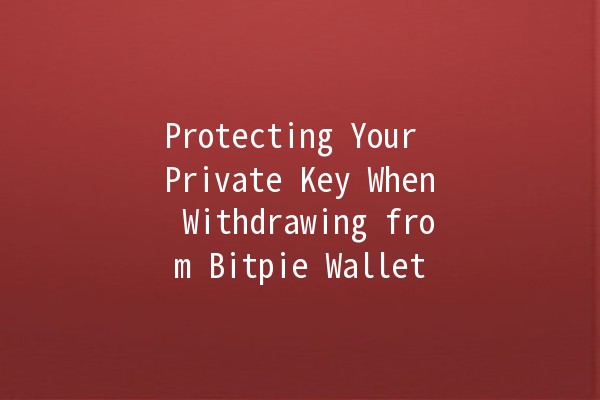
In the realm of cryptocurrency, securing your assets is paramount, especially when using wallets like Bitpie. One of the most crucial aspects of maintaining that security is the protection of your private key. The private key is your gateway to your funds; losing it could mean losing access to your cryptocurrency forever. This article delves into effective strategies to safeguard your private key during the withdrawal process from Bitpie Wallet, ensuring your crypto journey remains safe and secure.
Understand the Importance of Your Private Key
The private key is a cryptographic secret that allows you to access your digital assets. Unlike passwords that can be reset, if your private key is exposed or lost, you cannot retrieve your funds. This makes it essential to handle your private key with care. Whenever you're withdrawing funds from your Bitpie Wallet, it's vital to maintain strict control over your private key and be aware of the potential threats you may encounter.
Effective Tips to Protect Your Private Key
Description: Hardware wallets store your private key offline, making it much harder for hackers to access your funds.
Application: Consider using hardware wallets like Ledger or Trezor to withdraw your funds and only connect them to your computer when necessary. By doing so, your cryptocurrency will remain secure, even in the event of a software breach.
Description: Twofactor authentication provides an added layer of security beyond just your password.

Application: Activate 2FA on your Bitpie account. This typically involves using an app like Google Authenticator, which generates a unique code every 30 seconds. Whenever you attempt a withdrawal, you’ll need to enter this code, significantly enhancing your account’s security.
Description: Regular updates ensure that you have the latest security patches and features.
Application: Regularly update both your Bitpie wallet app and the device it runs on. Cybersecurity threats evolve constantly, and keeping your software up to date helps mitigate these risks.
Description: Phishing tactics can trick users into giving away their private keys or login credentials.
Application: Always verify the URLs of any website before entering your private information. Use bookmarks for important sites like Bitpie to avoid typing the URL manually. Be suspicious of unsolicited emails or messages claiming to be from Bitpie asking for your private key or other sensitive information.
Description: Backing up your private key ensures that you can recover your funds if necessary.
Application: Write down your private key and store it in a secure location such as a safe deposit box. You can also use securely encrypted USB drives to store a digital version of your backup. Just ensure it is not connected to the internet and is stored safely away from potential physical threats.
Key Steps During Withdrawal
When withdrawing from your Bitpie wallet, follow these best practices:
Log in Securely: Ensure you're using a secure internet connection when accessing your wallet. Avoid using public WiFi to log in as it poses additional risks.
Check Transaction Details: Before confirming any withdrawal, doublecheck the recipient’s address and the amount. Ensure all details are correct to avoid irreversible transactions.
Common Questions About Private Key Security
A private key is a unique string of alphanumeric characters that enables you to access and manage your cryptocurrency. It's crucial because it proves ownership of your assets. If someone has access to your private key, they can access your funds without your permission.
Unfortunately, no. If you lose your private key, you cannot access your funds anymore. It is essential to keep it secure and backed up.
Signs that your wallet may have been compromised include unrecognized withdrawals or transaction attempts. If you notice any unauthorized activity, immediately change your password and withdraw remaining funds to a new wallet.
No, storing your private key online can expose it to a range of threats including hacking. Use offline methods for storage whenever possible.
If you suspect phishing, stop all communication, do not enter personal information, and report the incident to Bitpie’s support team. It’s also advisable to change your passwords and enable or reinforce 2FA.
While software wallets can be more convenient, they often come with higher risk compared to hardware wallets. If you choose to use software wallets, ensure they have robust security features like 2FA, encryption, and regular updates.
Maintaining Longterm Security
Protecting your private key is an ongoing responsibility. Maintain vigilant habits including regular software updates, careful monitoring of your wallet activity, and using secure networks when accessing your accounts.
Explore reputable resources to stay informed on cybersecurity threats and best practices. Engaging in community forums specifically addressing cryptocurrency security can enhance your knowledge and empower you to secure your interests further.
By adopting these strategies, you can significantly enhance the security of your private key during withdrawals from Bitpie Wallet, ensuring that your crypto assets remain secure for the long term. Remember, the best defense is a proactive approach to security. Stay informed, stay cautious, and protect your digital assets wisely.

